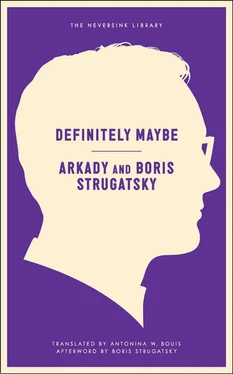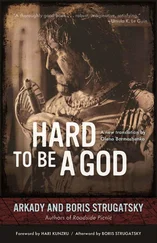“Which Lidochka?”
“You know, your school friend.”
“Ponomareva? What made you think of her?”
“Oh, you know,” I mumbled. “Just thought of her.” I hadn’t anticipated that question. “You know, Odessa, the battleship Potemkin . Just remembered her, that’s all. Why the third degree?”
Irina blinked a few times and then said: “I ran into her. She’s so beautiful now, has to beat men off with a stick.”
There was a pause. Damn it, I just can’t lie. Some trial balloon. Got it right between the eyes. Under Irina’s inquisitive gaze, I put my empty cup on the saucer and said in a phony voice, “I wonder how our tree is doing?” and went over to the balcony. Well, it was all clear about Lidochka now. Definitely. And how was our tree doing?
The tree was in place. The crowd was thinning. There was only the doorman, three janitors, the plumber, and two cops. There was also a yellow patrol car down there. All of them (except for the car, of course) were looking at the tree and exchanging opinions on what to do and what it meant. One of the cops had removed his cap and was wiping his shaved head with a handkerchief. It was getting hot in the yard, and the familiar odor of heated asphalt, dust, and gasoline had a new strain in it—woodsy and strange. The shaved cop put his cap back on, put away the handkerchief, and dug his finger in the fresh dirt. I stepped away from the balcony.
Irina was in the bathroom. I cleared and washed the dishes. I was terribly sleepy, but I knew I wouldn’t fall asleep. I probably wouldn’t sleep until this whole thing was over. I called Vecherovsky. As soon as I heard the ring, I remembered that he wasn’t supposed to be home today, he was giving exams to graduate students, but before I could hang up he answered.
“You’re home?” I asked stupidly.
“What can I say?” Vecherovsky replied.
“All right, all right. Did you see the tree?”
“Yes.”
“What do you think?”
“I think so.”
I glanced over toward the bathroom and, lowering my voice, said:
“I think it’s me.”
“Yes?”
“Uh-huh. I decided to bring my notes into order.”
“Did you?”
“Not completely. I’m going to try to finish up today.”
Vecherovsky was silent.
“What for?” he asked.
I was stumped.
“I don’t know, I wanted to clean it all up, all of a sudden. I don’t know. Regret, I guess. I felt sorry for my work. Aren’t you going out today?”
“I don’t think so. How’s Irina?”
“Chattering and chirping,” I said. I smiled involuntarily. “You know Irina. Like water off a duck’s back.”
“You told her?”
“Are you kidding? Of course not.”
“Why ‘of course’?”
I sighed.
“You see, Phil, I keep thinking about it myself. Should I tell her or not? I can’t figure it out.”
“When in doubt,” Vecherovsky declared, “do nothing.”
I was going to tell him that that was a piece of information I had learned without him when I heard Irina turn off the shower. I mumbled into the phone:
“Okay, I’m going to work now. If there’s anything, call me, I’ll be home.”
Irina got dressed and made up, kissed me on the nose, and hopped off. I lay back on the bed, cradling my head, and started to think. Kaliam appeared immediately, climbed up on me, and spread out along my side. He was soft, hot, and damp, and I fell asleep. It was like passing out. My consciousness disappeared, and then suddenly reappeared. Kaliam was no longer on the bed, and someone was ringing the doorbell. With the signal ta ta-ta ta-ta. I stood up. My head was clear, and I felt particularly scrappy. I was prepared for mortal combat and death. I knew that a cycle was beginning, but there was no more fear—just reckless, angry determination.
It was only Weingarten. A completely impossible thing: He was sweatier, messier, sloppier, and more unkempt than yesterday.
“What’s that tree?” he demanded right in the doorway. And another impossibility: He was whispering.
“You can speak up,” I said. “Come on in.”
He came in, stepping gingerly and looking around, shoved two shopping bags with manuscripts into the closet, and wiped his wet neck with his wet hand. I pulled Kaliam back in by the tail and shut the door.
“Well?” Weingarten said.
“As you see,” I replied. “Let’s go to my room.”
“Is the tree your work?”
“Mine.”
We sat down. I sat at the table, Weingarten in the chair next to it. His huge hairy stomach peeked out from under his net T-shirt and unbuttoned nylon windbreaker. He wheezed, puffed, dried himself off, and then contorted his body, getting at the pack of cigarettes in his back pocket. And he muttered a chain of curses, directed at nothing in particular.
“The battle goes on, then,” he finally said, exhaling thick streams of smoke through his hairy nostrils. “Better to die standing up, ta-ta, than on your knees… and all that. Jerk!” he shouted. “Have you been downstairs? You idiot! Did you at least see how it’s growing? It was an explosion! And what if it happened under your ass? Boom, ka-boom, and ta-ta!”
“What are you screaming for?” I asked. “Do you want some valerian drops?”
“Have any vodka?”
“No.”
“Some wine, then?”
“Nothing. What did you bring over for me?”
“My Nobel Prize!” he shouted. “I brought over my Nobel, that’s what! But not for you, you idiot! You have enough problems of your own.” He attacked his jacket, pulling off the top button and cursing. “There aren’t too many idiots nowadays,” he announced. “In our times, buddy, the majority quite rightly supposes that it’s better to be rich and healthy than poor and sick. We don’t need much: a trainload of bread and a trainload of caviar, and the caviar can be black and the bread white. This isn’t the nineteenth century, buddy,” he said sincerely. “The nineteenth century is dead and buried, and everything that’s left of it is smoke and nothing more, buddy. I didn’t sleep all night. Zakhar snores and so does that freak son of his. I spent the whole night bidding farewell to the remnants of the nineteenth century in my consciousness. The twentieth century, buddy, is all calculation and no emotion! Emotion, as we all know, is lack of information and nothing more. Pride, honor, future generations—all aristocratic babble. Athos, Porthos, and Aramis. I can’t do that. I don’t know how, ta-ta! A question of values? If you like. The most valuable thing in the world is my identity, my family, and my friends. The rest can go to hell. The rest is outside the parameters of my responsibility. Fight? Of course. For myself. My family; my friends. To the end, without mercy. But for humanity? For the dignity of earthlings? For galactic prestige? The hell with it! I don’t fight for words! I have more important things to worry about. You can do as you like. But I don’t recommend being an idiot.”
He jumped up and headed for the kitchen, a huge dirigible in the hallway. Water gushed from the sink.
“Our entire everyday life,” he shouted from the kitchen, “is a continuous chain of deals! You have to be a total idiot to make an unprofitable deal! They knew that even in the nineteenth century!” He stopped, and I could hear him gulping. Then the water stopped running, and Weingarten came back into the room, wiping his mouth. “Vecherovsky won’t give you any good advice. He’s a robot, not a man. And a nineteenth-century robot at that. If they had known how to make robots in the nineteenth century they would have made them like Vecherovsky. Look, you can consider me a vile person. I don’t argue. But I’m not going to let anyone wipe me out; no one. Not for anything. A living dog is better than a dead lion. And a living Weingarten is a hell of a lot better than a dead Weingarten. That’s Weingarten’s point of view, and that of his family and friends, I trust.”
Читать дальше












